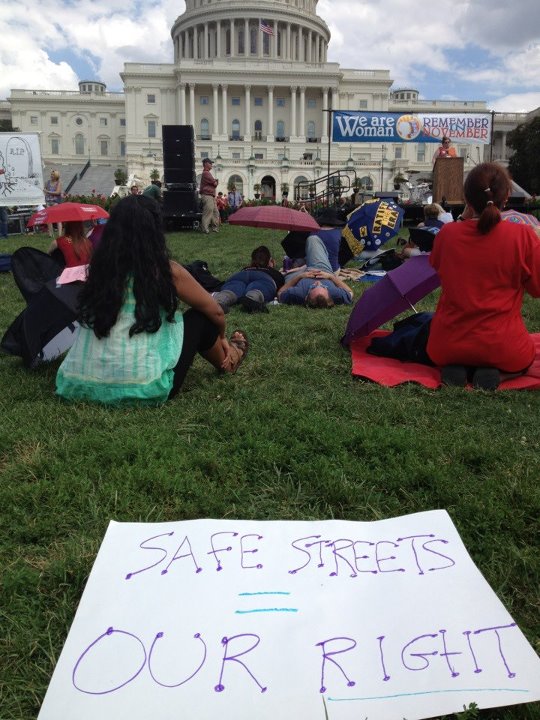 Editor’s Note: For Women’s Equality Day, I’m posting an excerpt of the speech I gave at the We Are Woman Rally in Washington, DC, last weekend. We should have equality, but we don’t. We don’t even have the right to walk down the street safely, without facing harassment. We must keep speaking out and demand that right!
Editor’s Note: For Women’s Equality Day, I’m posting an excerpt of the speech I gave at the We Are Woman Rally in Washington, DC, last weekend. We should have equality, but we don’t. We don’t even have the right to walk down the street safely, without facing harassment. We must keep speaking out and demand that right!
One of our most basic rights should be the right to walk down the street safely, without facing harassment, yet that is a right that many women are routinely denied.
Limited research shows that at least 80 percent of women have experienced gender-based street harassment, including unwanted leering, “catcalls,” sexually explicit comments, demands for a smile, groping, stalking, and public masturbation.
Two years ago, I wrote a book about this topic and I run a website where people share their stories. Two days ago, a 19-year-old shared her story and this is how she opened it:
“On most days I find that I get stopped on the street by men. On a few occasions they have been aggressive, threatening and have followed me home…I have become accustomed to being particularly cautious and paranoid when I walk anywhere alone. I thought it was normal for woman to feel unsafe when out alone.”
This is heartbreaking. But sadly, the reality is, feeling unsafe and cautious because of street harassment—or the threat of it—is a way of life for so many women.
Instead of street harassment being treated as the human rights violation that it is, typically, it’s normalized; it’s treated as a joke, a compliment, or the fault of the harassed person.
I was reminded of this in June when I led a successful Change.org petition to take down a “pro-street harassment” sign at a construction site in a New Jersey Mall. The fact that the sign existed at all was problematic and then, when the petition’s success was covered by major media outlets and discussed on radio shows and local blogs across the country, I was shocked by just how rampantly people engaged in victim-blaming or dismissed the issue altogether.
If you’re like me, you want to live in a world where women can go to school, work, community meetings, corner stores, and local parks safely. Here are three things you can to do make this happen.
1. Share your own stories (online and aloud), especially with men. Bring this issue out into the open. Make it so this human rights violation cannot be ignored anymore.
 2. Vote more women into office in the elections this November. A quick example why — this past February, I joined Collective Action for Safe Spaces in testifying about sexual harassment on the DC Metro system before the DC City Council during the transit authority’s performance oversight hearing. The transit authority kept downplaying our concerns, but, when the chair of the committee, Ward 4 Councilmember Muriel Bowser heard our stories, she told the transit authority leaders (all men) that they needed to do something. She said that, “As a woman, I feel differently” about the issue. Thanks to her, the transit authority has taken several measures to address the issue, including a new online reporting form and a public service announcement campaign.
2. Vote more women into office in the elections this November. A quick example why — this past February, I joined Collective Action for Safe Spaces in testifying about sexual harassment on the DC Metro system before the DC City Council during the transit authority’s performance oversight hearing. The transit authority kept downplaying our concerns, but, when the chair of the committee, Ward 4 Councilmember Muriel Bowser heard our stories, she told the transit authority leaders (all men) that they needed to do something. She said that, “As a woman, I feel differently” about the issue. Thanks to her, the transit authority has taken several measures to address the issue, including a new online reporting form and a public service announcement campaign.
3. Support an exciting new project that I am announcing for the first time. Four years ago, I founded Stop Street Harassment as an awareness-raising website. Now, Stop Street Harassment is a new nonprofit organization. The first project will be to work with a survey firm to conduct a sorely needed national street harassment study. You can help fund the street harassment study at www.StopStreetHarassment.org/Donate.
Now is the time to demand your right to safe streets! And together, let’s make sure that the next generation of women never has to think that feeling unsafe on the streets is normal!!
